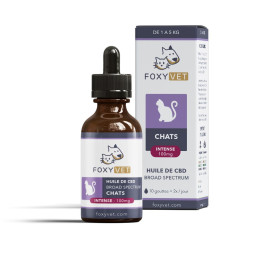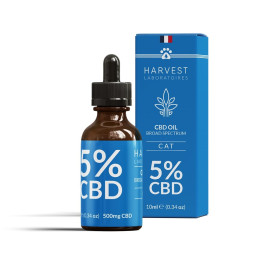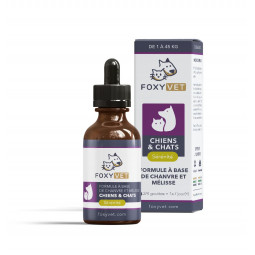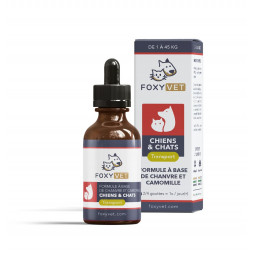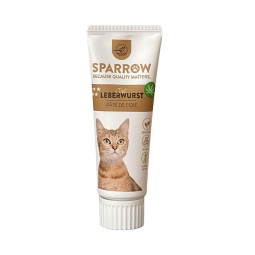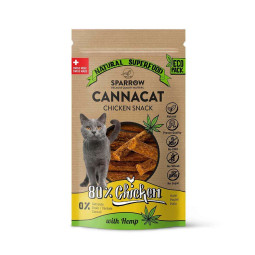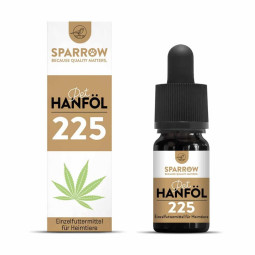Offering your cat a healthy and serene life is now possible thanks to CBD. This cannabinoid, known for its soothing and anti-inflammatory effects, is found in a variety of forms, including oils and treats. It can help manage stress, aggression and even some pain associated with osteoarthritis or cancer. However, dosing and dosage are key elements to consider for safe use. Find out how CBD can contribute to your feline's well-being.
Why give your cat cbd?
Giving CBD to a cat can be considered for a number of reasons, although it's crucial to proceed with caution and always consult a veterinarian before starting a CBD treatment for a pet. Here are just a few reasons why cat owners might consider CBD:
- Anxiety and stress: CBD is renowned for its calming effects. It can help reduce stress and anxiety in cats, especially in stressful situations such as traveling, moving, or changes in their daily environment.
- Pain and Inflammation: CBD has anti-inflammatory and analgesic properties that can help relieve pain in cats, particularly that associated with arthritis or other chronic inflammatory diseases.
- Appetite and digestion: Some cats may suffer from appetite problems or digestive disorders. CBD can help stimulate appetite and improve digestion, contributing to the animal's overall health.
- Convulsions: Although research is limited, there are indications that CBD may help reduce the frequency and severity of convulsions in some animals, including cats.
- General well-being: CBD can help improve the overall well-being of cats, boosting their immune system and contributing to their general health.
How do you give your cat CBD?
Giving CBD to a cat requires special attention to dosage and method of administration, as cats are much more sensitive to the substances than humans or dogs. Here are some tips for administering CBD to a cat:
- Veterinary consultation: Before starting, it's essential to consult a veterinarian. They can advise on safety, efficacy and appropriate dosage for your cat.
- Product Choice: Use a CBD product specially formulated for pets. These products are generally safer and have a dosage suitable for cats.
- Careful dosage: Cats require a very low dosage. Follow your veterinarian's recommendations or the instructions on the product packaging. It is often advisable to start with the smallest possible dose and observe the animal's reaction.
- Methods of administration: Directly into the mouth: Use a dropper to put CBD oil directly into the cat's mouth, under the tongue if possible. This method ensures rapid absorption. Mix with food or treats: If your cat doesn't accept direct administration, you can mix CBD oil with its food or a treat. Make sure the cat consumes the entire portion to ingest the full dose.
- Monitoring: Observe your cat after CBD administration for any changes in behavior or undesirable side effects. If you observe anything unusual, consult your veterinarian.
- Regularity and Patience: As with any supplement, the effects of CBD can take time to manifest themselves. It's important to maintain a regular routine and to be patient.
- Product quality: Make sure you're using a high-quality product. Check that the product has been laboratory-tested for purity and CBD content.
Understanding Cannabidiol for animals
Cannabidiol (CBD), a molecule derived from hemp, is increasingly used to improve the well-being and health of pets, especially cats. Unlike THC, another cannabinoid derived from hemp, CBD has no psychotropic effects, so it's perfectly safe for your pet. Cats, like humans, have an endocannabinoid system (ECS ) that reacts to cannabinoids like CBD. This system plays a key role in maintaining homeostasis, the body's internal balance. As such, CBD can help regulate various physiological processes in cats, contributing to their overall health and well-being.
The effects of CBD on cats
CBD can have beneficial effects on your cat's well-being. By acting on endocannabinoid receptors, present in most cells of the body, CBD can help reduce stress and anxiety, often caused by changes in the cat's environment.
It can also help relieve pain and inflammation, improve sleep quality and duration, and combat anxiety. Some cat owners have also observed that CBD can stimulate their pet's appetite.
What's more, CBD can be used as a natural alternative to certain more aggressive drug treatments, without replacing medical treatment.
The benefits of CBD oil for cats
CBD oil: a natural sedative for your cat
CBD oil is a natural supplement that can help soothe your cat. It has been recognized for its calming and relaxing effects, offering relief from stress and anxiety. What's more, it can be beneficial for cats suffering from nervous disorders or inflammation.
Some manufacturers enrich their CBD oil with omega-3s, essential nutrients for cats' well-being. These oils can help reduce sleep disorders, loss of appetite and nervousness.
It should be noted that CBD oil does not cause psychotropic effects, making it a safe option for animals. However, it is advisable to consult your vet before incorporating CBD oil into your cat's diet.
How to use CBD oil for a stressed or anxious cat
To use CBD oil on a stressed or anxious cat, start by selecting a quality oil with a CBD concentration suited to your cat's needs. Choose an oil with a low cannabinoid content, with a recommended level of 2% to 3% to avoid overdosing.
Administration: CBD oil can be administered directly into your cat's mouth or mixed with its food. For optimum absorption, we recommend that you administer it in drop form, preferably on an empty stomach.
Dosage: Dosage depends on your cat's weight and level of stress or anxiety. Start with a low dose and gradually increase if necessary.
Frequency: For best results, we recommend giving your cat CBD oil once or twice a day. However, in cases of intense stress or persistent anxiety, you can increase the frequency.
It is essential to closely monitor your cat's condition after administering CBD oil. If you notice any adverse effects, consult a veterinarian immediately.
The role of CBD oil in relieving osteoarthritis in cats
CBD oil is increasingly used for the relief of osteoarthritis in cats. Indeed, its ability to reduce inflammation and pain has been observed in several studies, making this natural product a potential ally in the management of this joint disease.
CBD works by interacting with the cat's endocannabinoid system, which plays a crucial role in pain regulation. CBD oil can thus help reduce the discomfort associated with cartilage degradation, typical of osteoarthritis.
Note: Although CBD is generally well tolerated by cats, it is essential to consult a veterinarian before incorporating it into your pet's diet. This will help determine the appropriate dosage and avoid possible side effects.
Using CBD oil to support cancer treatment in cats
CBD oil is also being considered for its potential support in the treatment of cancer in cats. CBD could help improve the quality of life of cats with this disease by relieving the side effects of cancer treatment, such as pain, insomnia, anxiety and nausea. What's more, some research suggests that CBD may slow or halt the development of cancer by fighting the development and expansion of tumor cells. However, it should be stressed that CBD oil should not be considered as an alternative to medical treatment prescribed by a veterinarian, but rather as a supplement. Before incorporating CBD oil into the diet of your cat suffering from cancer, it is advisable to consult a veterinarian to determine the appropriate dosage and closely monitor your pet's state of health.
The different forms of CBD for cats
CBD treats: a gourmet option for your cat
The market offers a varied range of CBD treats specially designed to satisfy the taste buds of our feline friends while providing them with the benefits of this molecule. These treats combine the relaxing, anti-inflammatory effects of CBD with quality ingredients, carefully selected for their nutritional value.
There are a variety of flavors, from beef and salmon to chicken and duck, to suit every cat's preferences. These treats can help reduce pain and inflammation, improve sleep quality and regulate your cat's mood.
They are a practical option for integrating CBD into your cat's daily life, without fear of addiction or side effects. However, it is advisable to consult your vet before introducing them into your pet's diet.
CBD kibbles: incorporating well-being into your daily diet
CBD kibbles are an interesting alternative for incorporating CBD into your feline's daily diet. These kibbles combine the beneficial properties of CBD with the nutrients your cat needs to stay healthy, such as protein, fiber and fat.
Some manufacturers even add taurine, an amino acid essential for your feline's healthy development. What's more, CBD kibbles have the advantage of being easily accepted by most cats, thanks to their similar texture and appearance to traditional kibbles.
Nevertheless, it should be pointed out that CBD dosage may vary from one brand to another. Some products contain Cannabis flowers rather than CBD directly, which lowers the CBD concentration.
We therefore recommend that you read the composition of kibbles carefully before giving them to your cat and, as always, consult your vet.
CBD dosage for cats: what you need to know
How to determine your cat's CBD dosage
To determine the right dosage of CBD for your cat, several factors need to be taken into account: weight, age, general state of health and the concentration of the CBD product. As a general rule, the dosage is between 0.2 and 5 mg of CBD per kilogram of the animal's body weight, to be adapted according to your cat's reaction.
- Cat weight: The heavier your cat, the higher the dose of CBD you'll need.
- Age of cat: Age may influence your cat's reaction to CBD. Older cats may require a lower dose.
- Health status: If your cat suffers from specific health problems, the dosage may need to be adapted according to the severity of these problems.
- Product concentration: The CBD concentration of the product you use is very important. A 3% oil contains 1.75 mg of CBD in 1 drop, while a 5% oil contains 2.5 mg.
We recommend starting with a lower dose and gradually increasing until you achieve the desired effect. Regular monitoring of your cat's health is also essential.
How many drops of CBD oil to give your cat
The precise dosage of CBD oil for your cat depends on its weight. Generally speaking, for a cat between 2 and 4 kg, we recommend 1 to 2 drops of CBD (i.e. around 0.5 mg to 1 mg per kg). A cat weighing between 4 and 6 kg requires around 2 to 4 drops of CBD (i.e. around 1 mg to 2 mg per kg). A cat between 6 and 8 kg may require 4 to 6 drops of CBD (i.e. around 2 mg to 3 mg per kg).
It's also essential to take into account the CBD concentration of the oil used. For example, 1 drop of 10% CBD oil contains more CBD than 1 drop of 5% oil.
Remember to start with a low dose and gradually increase if necessary, while carefully observing your cat's reactions. Always consult your veterinarian for a specific dosage for your pet.
Veterinarians' views on CBD for cats
Veterinarians' views on the use of CBD for cats are generally positive. They recognize the potential benefits of CBD, including anxiety relief, improved behavior and appetite, and reduced pain and inflammation. However, they warn that irregular CBD concentrations and the presence of contaminants in some products can cause gastrointestinal upset and sedation in cats. It is therefore crucial to choose quality products and carefully observe the animal's state of health following CBD administration.
Potential side effects and dangers of CBD in cats
CBD is generally well tolerated by cats. However, as with any supplement, there can be side effects. The most commonly reported are drowsiness, apathy and digestive disorders such as decreased appetite or diarrhea. Some cats may also experience dry mouth.
Excessive use of CBD can lead to increased lethargy, irritability or vomiting. It is therefore crucial to respect recommended dosages to avoid these risks.
It should also be noted that CBD interacts with certain medications. If your cat is undergoing treatment, a veterinary consultation is therefore essential before introducing CBD into its diet.
It is recommended to observe your cat carefully after CBD administration and to contact a veterinarian if any adverse effects are observed.


